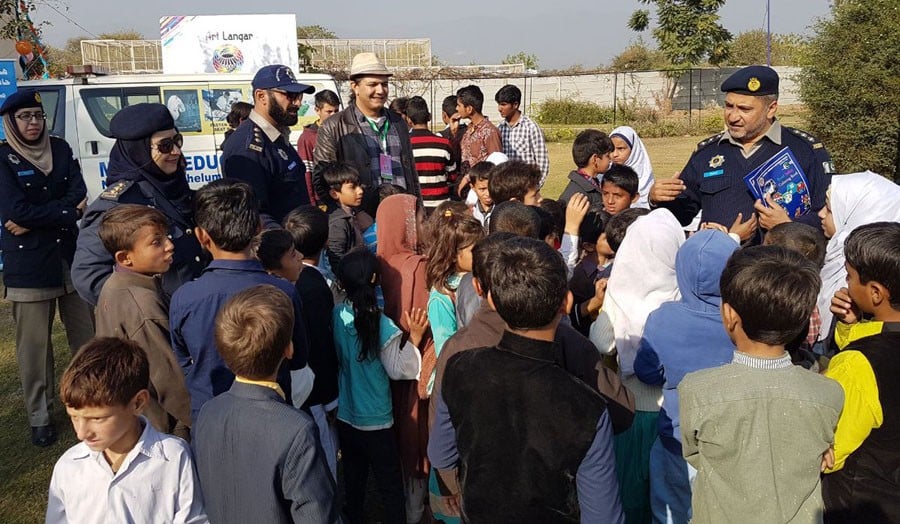
Arieb Azhar brings art to the underprivileged children

Art Langar is a unique concept introduced by Arieb Azhar, the popular folk singer and vocalist. He goes to the children at centres such as Mashal Model School and Pakistan Sweet Home and invites them to participate in an Art Langar. The first of such Art Langars was held on December 3 in Islamabad. And what a treat it was, one could see the beaming faces of hundreds of such children gathered near the Lakeview Park having alfresco fun to their heart’s content.
The idea is to bring these children closer to some aesthetic enjoyment; the children who have lost their parents to the vagaries of time or if they simply don’t care for them anymore such children either end up on streets or somehow get a refuge at one of the centre established for them. At these centres the children do get some basic care such as food, education, and shelter, but hardly ever anybody thinks about their craving for entertainment; well Arieb Azhar does. He wants to make art and music accessible to all, including the children with humble means.
In a country such as Pakistan where playing an instrument or going to the museum is a luxury even for well-to-do children, Arieb is doing a commendable job by offering such opportunities to the underprivileged ones. He is of the view that exposure to art should be considered as a fundamental right and could be beneficial for the society at large. He thinks that the violence prevalent in our society is one of the outcomes of a lack of entertainment opportunities for people and especially to the younger lot.
Artistic and cultural activities nurture a young mind into seeking pleasure not by hurting others but by driving satisfaction from creative pursuits. The Art Langar Festival failed to get sponsorships from corporate entities and became a huge challenge for Arieb and his team to pull it off. Their expectation was that some donors would come forward and support the festival but as it turned out, few were interested in the orphans and other marginalised children. The corporate sector in Pakistan talks a lot about the CSR (corporate social responsibility) but their CSR is also aimed at gaining potential markets for themselves which of course no orphan child can offer, hence the lack of support for this festival.
Despite financial constraints, Arieb managed to promote both i.e. promote art and engage some youth from the capital to buy tickets for this festival so that at least the bare minimum expenses could be paid. The festival did manage to offer opportunities to children to engage in artistic and musical sessions on one platform. The concept propounded by this festival was ‘give so that all may receive’. The festival lasted for two days and featured musical performances by well-known performers. In addition, a langar (free meals) was laid out for street children and orphans.
While having their free meals these children also expressed their immense pleasure at being able to enjoy a feeling of belonging with the wider community; they showed a vibrant enthusiasm for creativity and self-expression. Some of the children talking to this writer had tears in their eyes for a sense of inclusion being provided to them for the first time in their lives. They were full of gratitude for the centres that take care of them, but they never had an opportunity to interact with singers and artists. By listening to good live music, the kids were simply ecstatic.
Some of the youth who had purchased tickets for this festival also had a sense of civic responsibility. One of them remarked; "We can afford to buy tickets and go to such concerts, but this time around it is very different, here we are also contributing something for the benefit of these children". The usefulness of the event was further enhanced by the presence of professional artists who were creating innovative works of art in front of the children. Most of them were interactive and involved active participation from the children. There were also student societies that gave theatrical performances. There were also farmers’ market and refreshment stalls.
Those who performed at the festival included -- in addition to the organiser, Arieb Azhar -- Quratulain Baloch, Meekal Hasan Band, and to top it all the marvelous Khumariyaan. The orphans from Mashal Model School and Pakistan Sweet Homes were brought to the event by the organisers. They had ample time to have free meals and to interact with art works and music sessions. At the end of the festival, some of the children became so emotional that they wanted it to ‘continue forever’. Arieb is optimistic that the next time around the sponsors will show more interest by patronising the festival.
Despite all odds, Arieb plans to carry it forward to other cities such as Karachi and Lahore where the number of such children is staggering. He thinks that art and culture is the antidote to many of the maladies that we suffer from. Arieb’s sense of responsibility goes much beyond one-off festivals, he plans to set up an art academy for such children or a moving festival that goes from city to city much in the same fashion as the famous Spanish poet and dramatist, Garcia Lorca, did almost a century ago in Spain.
Lorca can serve as the role model for many of our artists, but his model demands a lot of sacrifices. With a lot of talk about a ‘new narrative’, Pakistan does need such festivals more often.